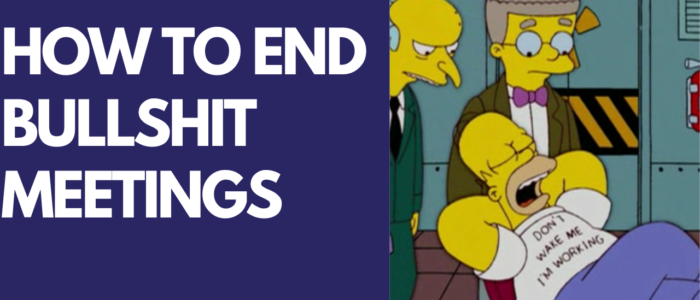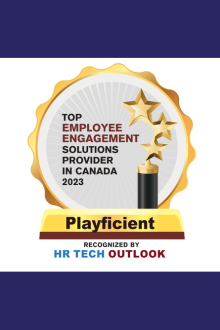How To End Bullshit Meetings
Ah, meetings. Who doesn’t hate them?
A case of can’t live with them, can’t live without them.
Or, in many cases, an email would have been more than enough.
I’m sure we’ve had our fair share of bullshit meetings. No meetings before 10AM please.
Ones that went on too long.
Ones that were a waste of time.
Worst of all, being early in the morning.
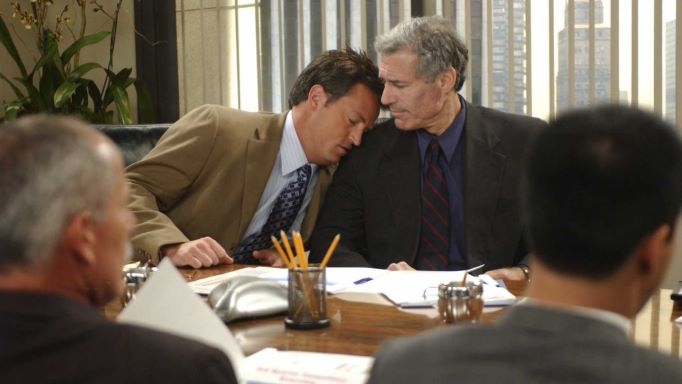
One reason your author became self-employed was to avoid early morning meetings.
With the huge uptick in remote work, there are have been complications. Yet, with all that, the main root of bullshit meetings still remains the same.
Some of these include the following:
- Running too long.
- People who don’t need to be there/too many people in a meeting.
- Too many meetings.
- Meetings with no point/better served with an email.
- Leadership and management setting a bad example of meetings + not being trained in running meetings.
The last point is something I don’t see discussed often.
Leadership would benefit receiving some training on how to run meetings.
What we’ll be looking at in this article:
- A Bunch of Stats on Meetings
- Some Well-Known Leaders & Their Thoughts on Meetings
- Various Insights From Employees on Meetings
- The Benefits of Meetings: The Other Side of the Coin
- Actions You Can Take To Create Better Meetings
1. A Bunch of Stats on Meetings
I went through many articles and papers on meetings. Here are some stats I collected.
Half Of All Meetings Are A Waste Of Time – Here’s How To Improve Them
- Only around 20 percent of leaders ever receive any training on how to run a meeting.
- There tends to be a single individual who thinks that they were a success. Those tend to be the organizers of the meeting, while the majority of people are quite frustrated with meetings.
- There are roughly 55 million meetings happening daily, and about half of them do not accomplish much.
How Managers Are Killing Productivity With Useless Meetings That Cost $37 Billion/Year
- Executives consider more than 67% of meetings to be failures.
MIT Sloan Management Review: The Science and Fiction of Meetings
- Meetings have increased in length and frequency over the past 50 years, to the point where executives spend an average of nearly 23 hours a week in them, up from less than 10 hours in the 1960s.
Useless Meetings Waste Time and $100 Million a Year for Big Companies
- Employees spend about 18 hours a week on average in meetings, and they only decline 14% of invites even though they’d prefer to back out of 31% of them.
- Reluctantly going to noncritical meetings wastes about $25,000 per employee annually, and projects out to $101 million a year for any organization with more than 5,000 employees.
- Women were more concerned than men about declining meetings for fear of bugging colleagues to bring them up to speed later.
- Data from Microsoft Corp. based on thousands of users of its workplace software found that time spent in meetings has more than tripled since February 2020, and the number of weekly meetings has more than doubled.
- Meeting declines did rise 84% over the past year, according to more recent data from Microsoft, but that’s likely due to the fact that overlapping meetings increased 46% during the same period.
- Employees end up multitasking during 70% of an unnecessary meeting.
In many cases, the only one who thought the meeting was a success was the leader of it.
2. Some Well-Known Leaders & Their Thoughts on Meetings
I looked up some articles on some well-known leaders that the media love to follow. Here are their thoughts on meetings.
Elon Musk
Say what you will about him, but his advice on meetings is pretty good.
Some excerpts from a company-wide email he sent in 2018:
Also get rid of frequent meetings, unless you are dealing with an extremely urgent matter.
Walk out of a meeting or drop off a call as soon as it is obvious you aren’t adding value. It is not rude to leave, it is rude to make someone stay and waste their time.
The point about leaving a meeting right away when you finish, or not adding value, is an interesting one.
Being seen as rude came up many times in the articles I read. People don’t want to others to see them as “rude” or “not a team player”.
Back in my employee days, I had many meetings where I would tune out after awhile. What would happen if I walked out?
Sure, it’s easy for Elon to say that, but what about for an employee? What happens in meetings with Elon where people walk out? Does he respect that, or get angry?
Say what you will about Elon, but I do agree with him in regards to how meetings can be a blight on an organization.
Jeff Bezos
One of the more dystopian photos I could find of Jeff.
This is a well-known one. Jeff Bezos wants meetings where two pizzas is enough to feed the entire group present. If that’s not enough? You have too many people.
Now, this doesn’t mean you need to order two pizzas for your meetings (although I’ll leave that up to you).
Also to note: This is what people would eat for pizza. Not cheat day for The Rock. Or your cheat day. That’s a lot of calories.

As well, Jeff is not a fan of early morning meetings, which I can agree with.
If the 13th Century Italian Poet Dante Alighieri wrote “The Divine Comedy” today, I’m sure one of the nine circles of Hell would contain those who schedule early morning meetings.
Note: If time zone differences cause this issue I can look the other way. Else you have no excuse for early morning meetings. Forgive me Lord for booking meetings first thing Monday morning!

Gary Vaynerchuk
Not a fan of the “hustle lifestyle” people worship about him, but he makes good points here.
From his Medium Post: This is How You Have Better Meetings
And yep. I mean time. Make your meeting half the amount of time that you originally thought it should be, and things will go much better for you.
Heck, even cut the meeting in half after you set it up. The amount of bull crap that goes on in a meeting, the set up, the agenda, is insane to me.
If you give people a ten pound bag, they are going to fill it with ten pounds of crap. If you give them a fifteen pound bag, it’s the same. Fifteen pounds of crap. They will never overfill the bag.
This is another way of saying Parkinson’s law: Work expands to fill the time available.
Shopify
In early January of 2023, an internal memo at Shopify announced a two-week pilot of scrapping most meetings to free up employee time. Some excerpts:
The memo urged staff to be “be really, really critical” about what meetings they’ll add back into their daily routines after the two-week trial period.
“No one joined Shopify to sit in meetings,” Nejatian wrote to employees.
Note before moving to the next section.
Because these successful organizations make use of these, it doesn’t mean you need to. think of it as a suggestion.
This is what I call the FAANG Effect. You copy what other organizations are doing because they’re successful.
Granted, shorter, smaller, less frequent meetings is something everyone can enjoy. Oh, and no early morning meetings.
3. Various Insights From Employees on Meetings
So in a perfect world we can take some of the advice from the leadership above and have no blowback.
Of course, reality being reality, most places won’t approve of that.
Micromanagers and those who thrive on making meetings for the sake of them won’t approve of that.
It’s common for the only person to feel the meeting was successful was the person who organized the meeting.
I wanted to get some insights from employees.
I looked up various threads on Reddit on meetings for some insights.
If you want to do some research on your own here, Google “Reddit Meetings” and take a gander. Here are some highlights:
“Working from home, and a culture that doesn’t really care if you have your video turned on (lots of crappy internet out there).. I often ‘attend’ meetings and keep working on productive work…”
“I get the feeling like some upper management types just like having meetings.”
“Some are pointless and it’s just to meet and say we did. Others are for a lot of detailed information and q&a’s to get things moving for a project (and line up tasks to complete before next meeting).”
“One thing the work from home situation has caused around my workplace is most meetings at least dropped from always being an hour to a half hour now, which really exposes how much time was wasted in the past”
“I have met many many junior people who absolutely love meetings because nothing needs to be done and they aren’t stressed over the meeting. Meanwhile for the people who are scheduled to get things done… meetings are counter productive.”
“Most meetings I’ve been to last hours, to deliver information that could have fit on a two page handout and could have taken a few minutes to teach.”
“There was a guy in my work who would bring a timer in. Walk into meeting, put it down and say “Ok go”. You had 40 minutes and he was gone. He had been there 30 years and was sick of 2 hour meetings that just rambled on for nothing. I loved it.”
I love that last one. I’m sure Elon would respect the dude. Image I found searching “old man with timer”.

4. The Benefits of Meetings: The Other Side of the Coin
When meetings are short, small, and focused, meetings are beneficial.
I came across this interesting article that takes a contrarian viewpoint. From ThinkGrowth: Yes, Meetings Are a Waste of Time. Here’s Why I Don’t Care.
Here are some excerpts:
But the stats can only paint a quantitative picture of what’s happening in meetings. Qualitatively speaking, meetings are a much more complex social phenomena than the numbers might lead us to believe.
Back in 1994, Hewlett-Packard explored some of these questions in a report titled “Informal Workplace Communication.” One of the first big takeaways from that report is just how commonplace informal communication is in the office.
A more recent study out of MIT found that informal communication between employees — in this case, chatting at the water cooler — promoted group cohesion, which in turn led to higher levels of productivity. Specifically, employees who ranked in the top third for group cohesiveness were shown to be 10% more productive than their less cohesive peers.
So maybe those 15 minutes you spend chit-chatting in meetings wasn’t a waste of time after all. In fact, it could potentially be making everyone more productive — not less.
There are some interesting points here about shooting the shit.
This is especially more notable now with more people working remote. Without that water cooler or breakroom, it is a little more difficult to do.
I don’t think that’s a bad thing to shoot the shit for a bit. Some of my fondest memories at past jobs were random discussions during meetings.
Things that didn’t have anything to do with the meeting. But they were great for our relationships and bonding. Shooting the breeze is another way of putting it.

5. Actions You Can Take To Create Better Meetings
What are some things that we can do to end bullshit meetings?
Train Management On Running Meetings
One of the more interesting articles I read on meetings was from Forbes: Half Of All Meetings Are A Waste Of Time – Here’s How To Improve Them. They interviewed Steven Rogelberg, author of The Surprising Science Of Meetings: How You Can Lead Your Team To Peak Performance.
Some excerpts:
At an organizational level, it is sobering to know that only around 20 percent of leaders ever receive any training on how to run a meeting.
If they do receive training, that training is typically not meaningful. Much of the training out there revolves around, “Hey, do this tactic and meetings will get better.”
Organizations are not doing any type of accountability or assessment of how their meetings are going.
You need to ask people for input because meetings are shared experiences. You need to ask folks what they want to cover. Even more importantly, you have to be able to facilitate that agenda. You must truly create an environment where people can engage and participate in good conversation.
You have to ask yourself why you are getting together and what everyone is trying to decide or do. That process helps you figure out the meaning of the meetings.
Something I thought of was that meeting leaders should assess the meetings personally. If you have folks that you regularly meet with and you are the meeting leader, you should check in with them. This includes a quick survey on what is going well, what is not going well, and what can be done differently.
Organizations love to measure everything under the sun. That said, I’ve never worked somewhere that measured how effective meetings were.
There were plenty of bullshit meetings. I’m sure you deal with them.
Why not measure something that we spend so much time in? Running meetings is a skill like any other.
You can get feedback from attendees on the regular.
Googling “meeting training” brings up organizations who specialize in that.
Have Shorter Meetings
Most feedback on meetings are them being too long. This came up many times in reading through these articles.
As Parkinson’s Law states, work expands to fill the time available. Relevant comic

Try scheduling something for 30 minutes. Or 15. Or 17.25 minutes. You’ll surprise yourself with what you can get done.
You could be like that one guy from the Reddit thread:
Have Fewer Attendees
Remember the two pizza rule. Two pizzas should be enough to feed everyone present in a meeting.
Otherwise, you have too many people.
If you do order two pizzas to test, expect more people to show up. Think more figurative than literal.
Although pizza at a meeting is fine every once in awhile.
Leave When No Longer Needed
This is more tricky to pull off. People don’t want to others to see them as rude or not a team player.
Implementing it in your meeting culture will take some time.
I’m not suggesting that people get up and leave, or log off right when they finish.
From collecting feedback, you can get a better idea when attendees can leave.
When leaving, it can be something like:
“I don’t have anything else to add here so I’ll be leaving. Email me if you have any questions.”
Do A Trial Run Of Fewer Meetings.
Earlier in the article, I brought up Shopify and their two-week trial of cutting back on meetings.
This was the following criteria for their pilot:
Recurring meetings with three or more people, all meetings on Wednesdays, and meetings with 50 or more people outside of Thursdays from 11 a.m. to 5 p.m. ET will all be canceled.
You could try setting a day where no meetings are to be held. You could try elminating recurring meetings that have more than a set number of attendees.
You can take all the findings from this test and move forward.
On the note of Shopify, as of updating this article in January 2023, the jury is still out on the success of their trial. I wouldn’t be surprised if people are more than happy about the change.
Well, those don’t book meetings for the sake of filling time and to appear busy.
Cut Down On Meetings
If the thought “Could this have been an email?” pops up, then have it be an email.
Here’s some flowcharts I found on the topic to help:
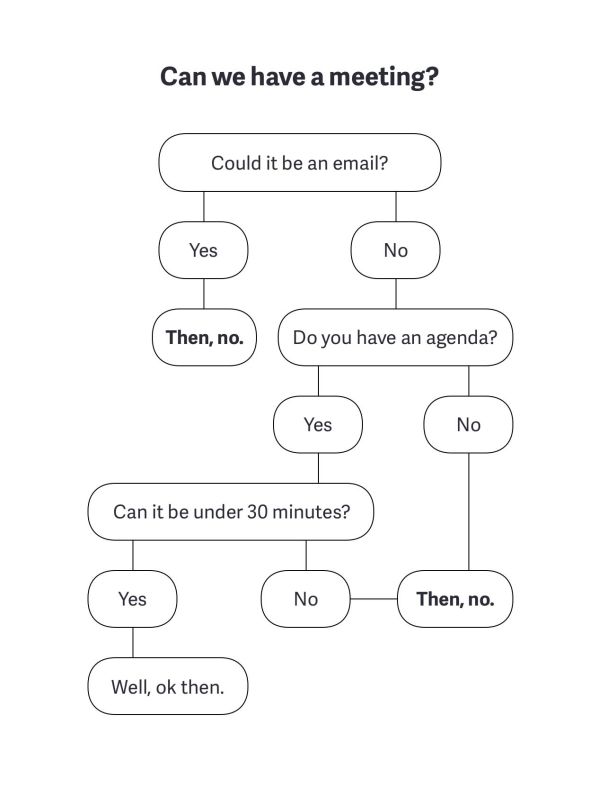
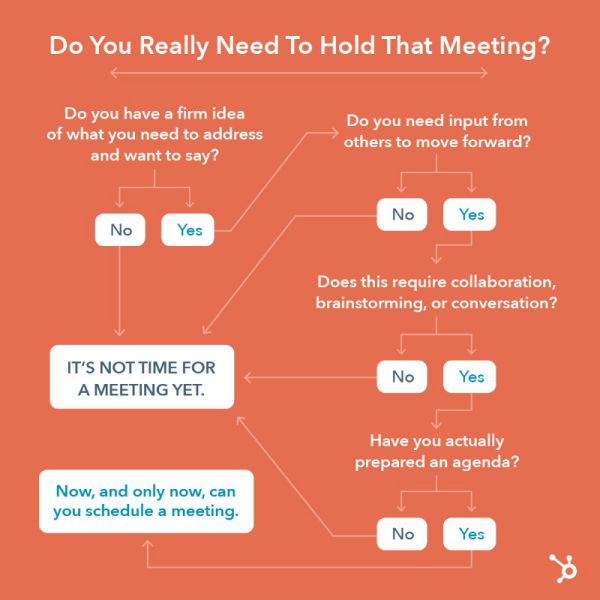
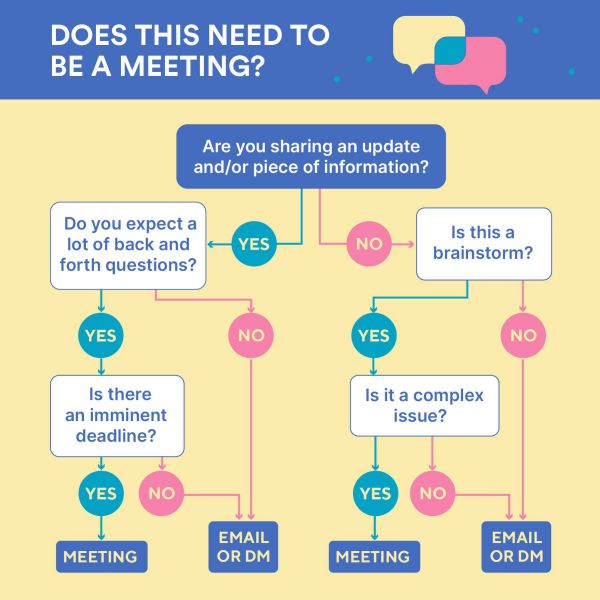
Taking all these factors into consideration, you can end bullshit meetings.
With all that time saved, employees can spend their time on their work.
If you want to get extra spicy, you can even try four day work weeks.
It’s amazing what you can do when you address bullshit meetings.
Thanks for reading.

